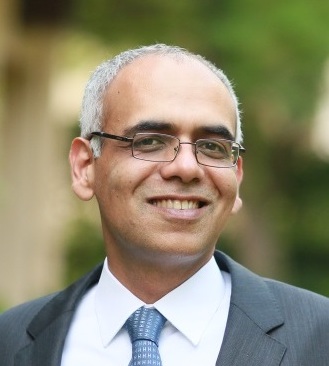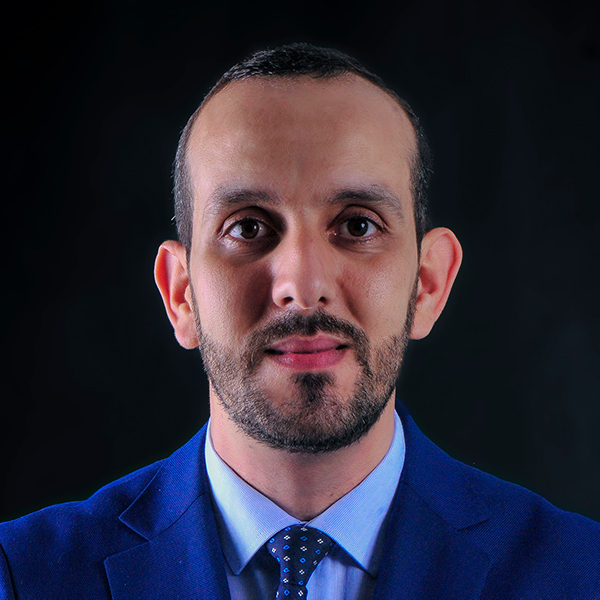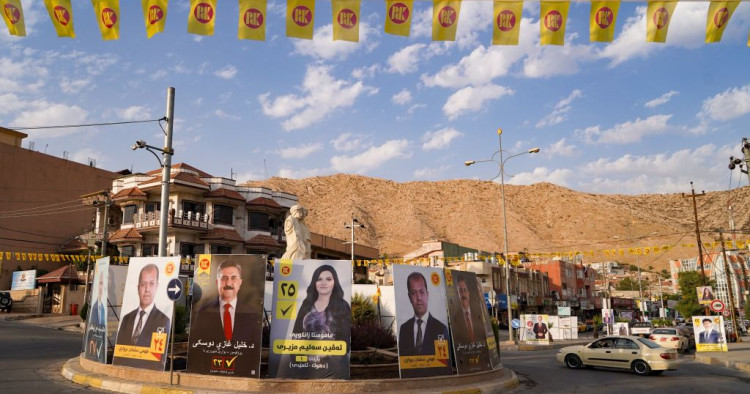Contents:
- The Tishreen anniversary, a muted affair in the run-up to Iraq’s elections
- Israeli Foreign Minister Lapid visits Bahrain
- Qatar holds its oft-postponed parliamentary elections
- Why scapegoating Pakistan will not bode well for stabilizing Afghanistan
- The Sahara territory from Trump's proclamation to the EU court judgment
- Pakistan’s attempts to further muzzle media run into strong headwinds
The Tishreen anniversary, a muted affair in the run-up to Iraq’s elections
Hafsa Halawa
Non-Resident Scholar

On Oct. 1, several hundred Iraqis gathered and marched, protesting the lack of change on the anniversary of the Tishreen movement that broke out two years to the day and rocked the Iraqi political elite. The gatherings were small and the protests muted, surrounded by election flyers and candidate posters as Iraqis prepare to go to the polls on Oct. 10 in early parliamentary elections. This year’s election will be like no other in Iraq’s post-2003 landscape, with a new electoral law that is supposedly more democratic, but unlikely to yield better results. Armed non-state actors are running in their own name for the first time, while entrenched political parties and their militias look set to continue their fight, as they parcel out the political spoils, over who has the undesirable job of promoting or becoming prime minister. Overall, little in the power structures is likely to change.
The Tishreen movement itself approaches the elections divided — as has been predicted for many months. Reflecting the perils of any successful political movement, it comes as no surprise that up to five political parties have formed out of the movement. Struggling against activists who advocate a boycott of the entire vote, these parties are trying to galvanize their supporters and ensure a turnout that can make a mark on the established political landscape. While optimists within these parties aim for up to 15 seats in the incoming parliament, out of a total of 329, a more modest aspiration of around five seats is more likely. Nevertheless, any showing by the electorate that awards Tishreenis seats should be celebrated, providing an opening — however small it may be — to bring about the fundamental change that so many ordinary Iraqis wish to see.
Since 2019, the Tishreen movement’s core call for accountability has fallen on deaf ears, met only with silence from politicians and the guns of militia fighters. Holding early elections in a changed electoral system may seem on the face of it to have responded to protestor demands. But Tishreen — support it or not — has seeped into the Iraqi psyche, becoming a catch-all phrase that refers to dissent, a representation of the continued anger among citizens. Whatever the results of these elections, without a genuine response to state-sponsored violence — including armed non-state actors — corruption, and political and economic reform, the issues that drove the Tishreen movement will continue to fester, contributing to persistent instability in Iraq.
Israeli Foreign Minister Lapid visits Bahrain
Mark A. Heller
Non-Resident Scholar

One year after the signing of the Abraham Accords, Israeli Foreign Minister Yair Lapid traveled to Manama last week to inaugurate the Israeli Embassy in Bahrain. Lapid (along with many other Israeli officials, businesspeople, and tourists) had already been to the UAE and Morocco — though not yet to Bahrain (his Bahraini counterpart had visited Israel in November 2020).
Like the original agreements themselves, this visit had both bilateral and regional dimensions.
With regard to the former, Lapid signed several memoranda in the areas of energy, infrastructure, environment, and public health. These documents formalized ongoing and future cooperation projects that have taken on additional importance in light of Bahrain’s economic strains over the past year; the combined impact of COVID-19 and falling oil prices resulted in declining GDP and growing budget deficits. The rebound in oil prices is expected to lead to an economic recovery, but bilateral cooperation can accelerate that process and confer benefits in other areas, such as food security and water management. The acceleration of bilateral relations was symbolized by Gulf Air’s inaugural direct flight to Tel Aviv during Lapid’s visit.
At the same time, the regional/geopolitical dimension over the past year has become, if anything, even more salient. A variety of developments, such as the election of hard-liner Ebrahim Raisi as president of Iran and the inability of the Biden administration to advance U.S.-Iranian relations and the nuclear negotiations, has sustained both Bahraini and Israeli interest in exploring the benefits of security cooperation, especially in the context of a trilateral relationship with the U.S. The symbolic significance of Lapid’s highly-publicized visit to the headquarters in Manama of the U.S. Fifth Fleet, in the company of Bahraini Foreign Minister Abdullatif bin Rashid al-Zayani, was certainly not lost on Iran.
In response, Iran’s Foreign Ministry condemned the Lapid visit as a “stain that will not be erased from the reputation of Bahrain’s rulers” and warned that “the people of the region” will continue to oppose normalization with “the Zionist regime.” As if on cue, remnants of the banned Bahraini Shi’ite movement al-Wifaq staged some protests on the outskirts of Manama, in keeping with Wifaq’s denunciation of the Abraham Accords as a “betrayal of Islam and Arabism.” Unlike the UAE, where confessional tensions are not really a factor in determining relations with Israel, Bahrain has a large Shi’ite community — as much of 70% of the population by many estimates — and the regime needs to factor in the level of their discontent (and the level of domestic Iranian influence) on this as well as on other issues.
Nevertheless, the official reception of Lapid was warm and welcoming, and it included a meeting with King Hamad bin Isa al-Khalifa and Crown Prince Salman bin Hamad. Other sectors of society, including the business community, were also receptive, and the Gulf Air flight was given live enthusiastic TV coverage. The message seems to be that the Bahraini establishment, while not indifferent to religious strains in the country, is not prepared to back down in the face of domestic dissatisfaction with its policy vis-à-vis Israel, or of the barely-muted Iranian threats hovering in the background. In fact, the latter only drive Israeli-Bahraini intimacy to new levels.
Qatar holds its oft-postponed parliamentary elections
Gerald M. Feierstein
Senior Vice President

Qataris went to the polls for the first time on Oct. 2 to select two-thirds of the 45-member Shura Council. The other 15 members will be appointed by the emir. The election comes 15 years after planned elections were initially announced. A variety of issues delayed the voting beginning in 2007 until Sheikh Tamim bin Hamad al-Thani committed again last year to hold them. The new election law, enacted earlier this summer, restricts voting to descendants of those holding Qatari nationality in 1930, barring naturalized citizens and members of the al-Murrah tribe. The latter has had a fractious relationship with the Qatari government over the years, including during the 2017 confrontation with Doha by the quartet of Saudi Arabia, Bahrain, the UAE, and Egypt. Their disqualification from the elections engendered further conflict with the government and led to seven individuals being charged with “publishing fake news” and inciting “racial and tribal arrogance” on social media. Turnout was reported at 63.5%.
Under the constitution, approved by popular referendum in 2003, the Shura Council is responsible for three things: approving the national budget; monitoring the performance of ministers, including through no-confidence motions; and drafting, reviewing, and voting on legislation. Approved legislation requires a two-thirds majority vote and approval by the emir. Given the structure of the Shura, it’s unlikely that legislation not acceptable to the emir could survive a vote.
With political parties banned, all of the 284 candidates in the single constituency, first-past-the-post voting stood as independents. Thus, it’s difficult to identify whether there will be voting blocs in the new Council. Several of the successful candidates appear to have been either previously appointees or their close relatives. Twenty-nine of the candidates were women. (Four women currently serve in the Shura Council appointed by the emir.) Although none of the women successfully contested for a constituency, it’s likely that the emir will exercise his prerogative to appoint women to the Council.
Why scapegoating Pakistan will not bode well for stabilizing Afghanistan
Syed Mohammad Ali
Non-Resident Scholar

The proposed “Afghanistan Counterterrorism, Oversight, and Accountability Act of 2021” has stirred up significant controversy in Pakistan. The 57-page draft bill by 22 Republican senators calls for an assessment of the alleged role of the state, non-state actors, and the government of Pakistan in supporting the Taliban offensive leading to the fall of Kabul. The draft bill’s proposal for the U.S. to investigate Pakistan’s role in the fall of the Panjshir Valley is particularly contentious. Pakistani National Security Advisor Moeed Yusuf recently appeared on CNN, where he showed screenshots of Indian media circulating old and out of context videos — including an American jet flying over Wales in the United Kingdom — as alleged proof of Pakistani support for the Taliban’s takeover of Panjshir. The draft bill’s reference to Pakistan’s involvement in the fall of Panjshir is thus being interpreted as a sign of the Indian lobby’s growing influence on U.S. policy makers.
While the draft bill has little chance of passage, it is being viewed within Pakistan as a sign of potentially more ominous developments. The evenly split Senate would make it difficult for the draft bill to gain further momentum, unless some Democrats also endorse it. Yet, this proposal to single out Pakistan for the current situation in Afghanistan, coming on the heels of U.S. Secretary of State Antony Blinken’s announcement that the Biden administration is also going to assess the role Pakistan played in Afghanistan during the 20-year war, is concerning.
Many Pakistani pundits fear that the U.S. is bound to scapegoat Pakistan for its own failures and the inability of the former Afghan government to resist the Taliban onslaught. Pakistani Prime Minister Imran Khan is instead advocating that the international community, including the U.S., must acknowledge the ground realities and resume support to Afghanistan to avert a descent into chaos. The behavior of the incumbent Taliban caretaker government hardly inspires confidence. Yet, the fear of attrition is perhaps hindering the Taliban from exhibiting a more reformist political agenda. Engagement with the Taliban may therefore enable the international community to ensure that they do not return to their brutal style of governance. Pakistan’s intermediation would prove useful in this regard. Pakistan can also play an important role in helping ensure that global jihadi networks like the Islamic State do not further consolidate in the region. Ex post facto blaming or even sanctioning Pakistan would not help achieve either of these goals.
The Sahara territory from Trump's proclamation to the EU court judgment
Rachid Aourraz
Non-resident Scholar

On Sept. 29, the General Court of the European Union (EU) issued a judgment that canceled the amendments to Protocols 1 and 4 of the Association Agreement between the EU and Morocco. The agreement covered different products and activities, including agricultural products and sustainable fishing, and was introduced in June 2019.
A few minutes after the court’s decision was announced, the Moroccan Ministry of Foreign Affairs and High Representative of the EU for Foreign Affairs and Security Policy Josep Borrell Fontelles published a joint statement declaring that they will "take the necessary measures to ensure the legal framework which guarantees the continuity and stability of trade relations."
The court's judgment caused significant damage to Morocco's national cause when it affirmed that the Polisario Front is the legitimate representative of the population of the Sahara region, and this comes after the Trump administration’s recognition of Morocco’s sovereignty over the region in December 2020. This judgment has given new life to the Polisario Front, which had been suffering from extreme isolation in recent years.
The goal of the Moroccan-European partnership was not purely commercial, but also political. By including the Sahara territory in the 2019 agreement, the EU indirectly recognizes Moroccan sovereignty over it. Yet, the new ruling by the European Court of Justice has damaged Morocco’s accumulated political gains and destabilizes the political balance between the EU and Morocco. Moreover, it will likely also fuel regional conflict between Morocco and Algeria, the main supporter of the Polisario Front, as well as separatist tendencies in the Sahara region by highlighting the Polisario Front and supporting Algeria's efforts to keep the conflict raging — a strategy Algiers has adopted in its long-running confrontation with Rabat since the Sand War between the two countries in 1963-64.
Morocco says that the recent judgments issued by the European Court of Justice intentionally ignored that Saharan entrepreneurs invest heavily in the region’s agricultural and fishing sectors. They also participate in the local elected institutions and the parliament, and part of the revenues generated are invested in infrastructure in the Sahara region.
Before the vote on Oct. 27 in the U.N. Security Council on the renewal of the mandate of MINURSO, the regional U.N. peacekeeping mission, much will be on the table, including not only the proclamation of Donald Trump, but also the judgment of the European Court of Justice — both a decision claiming Moroccan sovereignty over the Sahara and a court ruling saying that the Polisario Front is the legitimate representative of the Saharan population.
It seems that Staffan de Mistura, the U.N. personal envoy for Sahara, will find many cards on the table, as well as big contradictions. De Mistura may revive the negotiation track and expedite discussions about the Moroccan autonomy project stipulated in Trump's own declaration, which put the recognition of Moroccan sovereignty within the framework of the autonomy project according to an international track. It is also possible that things will develop in unexpected ways in light of the recent escalation in tensions between Morocco and Algeria.
Pakistan’s attempts to further muzzle media run into strong headwinds
Marvin G. Weinbaum
Director, Afghanistan and Pakistan Studies

According to Prime Minister Imran Khan, the media in Pakistan enjoy “unprecedented freedom,” more than has been allowed by previous governments. This freedom he proclaimed was, however, regularly being used by digital media to slander him, and he further charged that 70% of TV programs and three major dailies were slanting news against his government. Khan was reacting to fierce criticism of a proposed Pakistan Tehreek-e-Insaf (PTI) government media ordinance creating a new Pakistan Media Development Authority (PMDA), purportedly designed to prevent the airing of fake news and misinformation that threatened national security. The proposal would also police film productions and screenings, and envisaged special tribunals, operating under the PMDA, that would have the power to hand down heavy penalties. Leading elements of civil society and opposition political parties, describing these plans as centralized censorship, have declared them unconstitutional. The ordinance, which had been kept secret until being leaked to the media, is being bitterly criticized as an attempt to bypass parliamentary debate and democratic processes.
The proposed new regulatory body would also assume control over social media content. Where digital media has been frequently cited for furthering anti-social and anti-state behavior, the government’s handling of the country’s digital media has been stricter than for other forms of media. Last week the federal cabinet approved an amendment to legislative rules established last year that would compel social media companies to more quickly take down or block access to online content. These tech companies were also required to establish offices in Pakistan. Complaining that their operations were being impeded, they have threatened to disconnect their services.
Pakistan can boast of a very lively, if at time unruly, media scene. It also has a long history of stifling independent media voices, especially in areas of national security policy and religion, and in matters touching on the military establishment. (The federal cabinet last week reviewed criminal law reforms enacted last year with the intention of adding a section making it explicitly a punishable criminal offense to ridicule, dispute, or defame the armed forces.) The Khan government is close to the military, but previous elected governments have also observed these red lines. Over the years journalists who strayed have been threatened or subjected to physical abuse and abduction. Television talk shows have been taken off the air and anchors banned. To keep the country’s press in line, Pakistan’s governments regularly threaten to withhold valuable government advertising, and intimidation can also be used to elicit favorable coverage.
For a government seeking to improve its global image, this latest tug of war with the media comes at an inopportune time, and it may find a way to allay some of the worst fears of its media industry critics. But the Khan government’s determination to gain a tighter grip on all forms of media remains strong as its insecurities mount, those both domestic and external.
This article was co-authored by Makhdum Karam Shah, research assistant to Marvin G. Weinbaum.
Follow on Twitter: @mgweinbaum
Photo by ISMAEL ADNAN/AFP via Getty Images
The Middle East Institute (MEI) is an independent, non-partisan, non-for-profit, educational organization. It does not engage in advocacy and its scholars’ opinions are their own. MEI welcomes financial donations, but retains sole editorial control over its work and its publications reflect only the authors’ views. For a listing of MEI donors, please click here.













